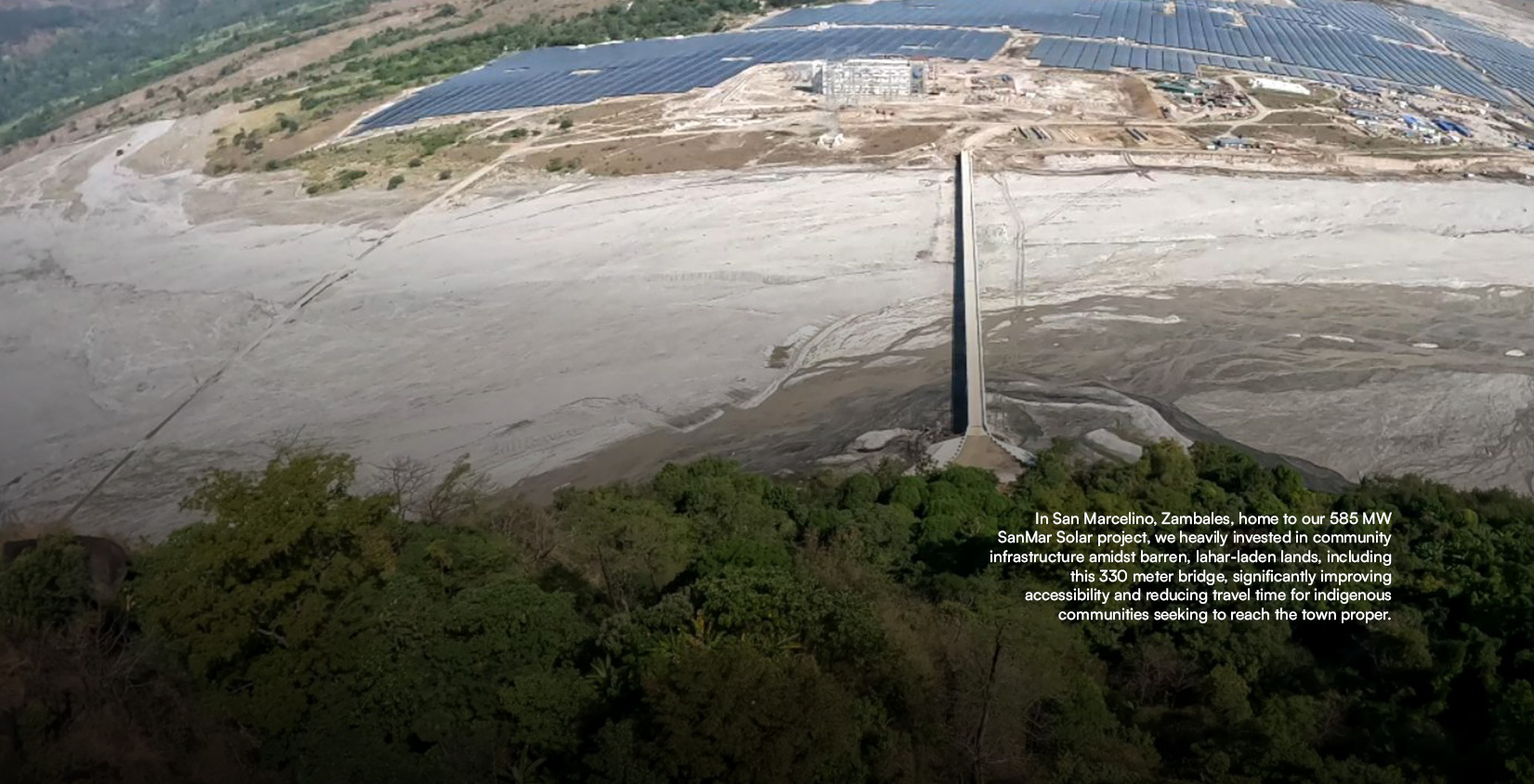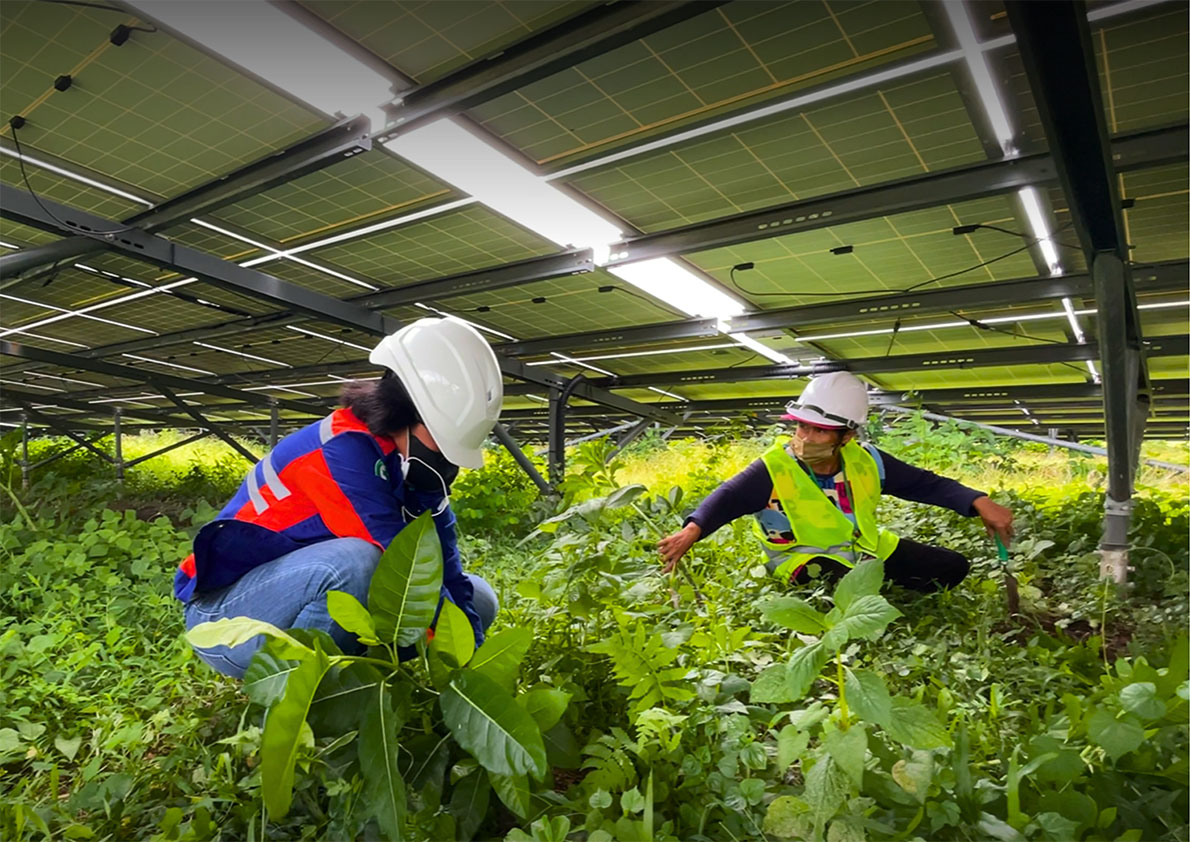-

Resource efficiency
Home » Sustainability » ESG » Social » Our community » Resource efficiency
Home » Sustainability » ESG » Social » Our community » Resource efficiency
At ACEN, our commitment to sustainability extends through every aspect of our operations, particularly in how we manage and utilize resources. From developing resource efficiency programs at the construction and operational phases of our plants to developing programs that create shared value with our communities, we continue to challenge boundaries.
Our agrivoltaics program in the Philippines exemplifies our approach to resource efficiency, utilizing land for both solar energy generation and agricultural production. This innovative farming system addresses the dual imperative of transitioning to clean energy while bolstering food supply.
Our agrivoltaics initiative in the Philippines represents a harmonious blend of renewable energy generation and agricultural productivity. It maximizes the use of land to benefit both the environment and the local economy. This innovative system leverages the dual use of land for solar photovoltaic installations and agricultural cultivation, addressing the dual challenges of clean energy transition and food security.

Strategic approach and SPI alignment The strategic placement of crops beneath solar panels and the revitalization of idle spaces within our generation facilities optimize land use. This symbiosis between agriculture and solar energy not only enhances the efficiency of our solar panels by reducing their heat but also provides crops with much-needed shade, thereby reducing water consumption and improving agricultural yields.
Moving forward As we advance, we focus on scaling up the agrivoltaics program, integrating cutting-edge agricultural techniques to boost efficiency and production. By enhancing support for post-processing and market linkage, we aim to further empower our partner cooperatives and farmers, ensuring the continued growth of this sustainable model.
Our broader resource efficiency initiatives, including solar grazing, underscore our commitment to sustainable development, driving positive change for both society and environment. Solar grazing, employing sheep as natural grasscutters, is a cost-efficient way to manage vegetation growth beneath solar panels, reducing the need for machinery and harmful herbicides. It also fosters biodiversity by creating habitats for various plant and animal species, contributing to the overall ecological health of the area.

Strategic approach and SPI alignment Philippine initiatives:
Global initiatives:
Moving forward Looking ahead, we will scale up sheep and cattle farming within our Philippine and Australia solar facilities. We will continue to seek ways to maximize resource efficiency as the world grapples with the dual challenges of climate change and sustainable land use while creating a positive impact on the surrounding communities.
Our commitment to circularity transcends the boundaries of our project sites, reaching into the heart of the communities we serve. Through the establishment of Community Eco Hubs, we not only address waste management challenges but also enhance the environmental quality and overall health of our partner communities, aligning our efforts with the ‘Environmental Quality’ and ‘Health and Wellness’ indicators of the Social Progress Index (SPI).

In July 2023, we began constructing the Alaminos Community Eco Hub adjacent to our Alaminos Solar farm in Laguna, Philippines to scale up our waste management approach. Our second project with Green Antz, the Alaminos Community Eco Hub, with the support of the local government of Alaminos, Laguna, will serve as a recycling facility to convert the community’s plastic waste into eco-bricks as part of the company’s strengthened circularity framework. The eco-products will then be used in our plant facilities and other community infrastructure.
In photo (from L-R): Michael Zotomayor, former lead for Luzon solar plant operations; Lord Lee Van Burgos, lead for Philippine plant operations; Irene Maranan, SVP & head for corporate communications and sustainability; Glenn Flores, Alaminos mayor; Miguel de Jesus, chief operating officer for Philippine operations; Rommel Benig, Green Antz president & CEO
Strategic approach and SPI alignment
Moving forward
As we continue to grow and develop new renewable energy projects, our dedication to a circular waste management approach remains. We are exploring opportunities to broaden the scope of our circularity initiatives beyond plastic waste, incorporating other materials such as wooden pallets. By weaving circularity principles into every facet of our operations and collaborating with stakeholders across the spectrum, we aim to amplify our positive environmental impact, foster green job creation, and champion climate-resilient strategies.
This evolution of our circularity approach demonstrates our holistic commitment to environmental management and social progress. We strive to not only mitigate our environmental footprint but also enrich the communities we are privileged to serve.